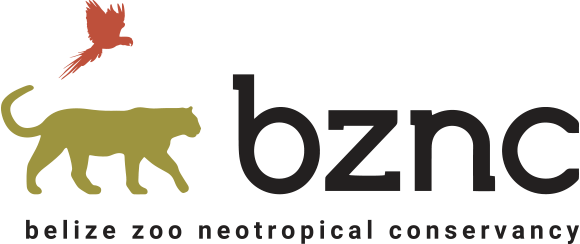“Doing good holds the power to transform us on the inside, and then ripple out in ever-expanding circles that positively impact the world at large.”
Our capital campaign building project is complete! However, the clinic and commissary are not fully functional until they are outfitted with the proper equipment. Your generous donations supported the purchase of a much-needed ultra-sound machine.
Ultrasound machine: Your donations of $23,149.00 provided a much-needed ultrasound machine for the new Belize Zoo Veterinary Clinic. Dr. Adam Denish (veterinarian), Dr. Jen MacLeod (surgeon) and Dr. Sandy MacLeod (radiologist) traveled from Pennsylvania to Belize to set up the new ultrasound and train Belize Zoo staff members and a local Vet in its use.
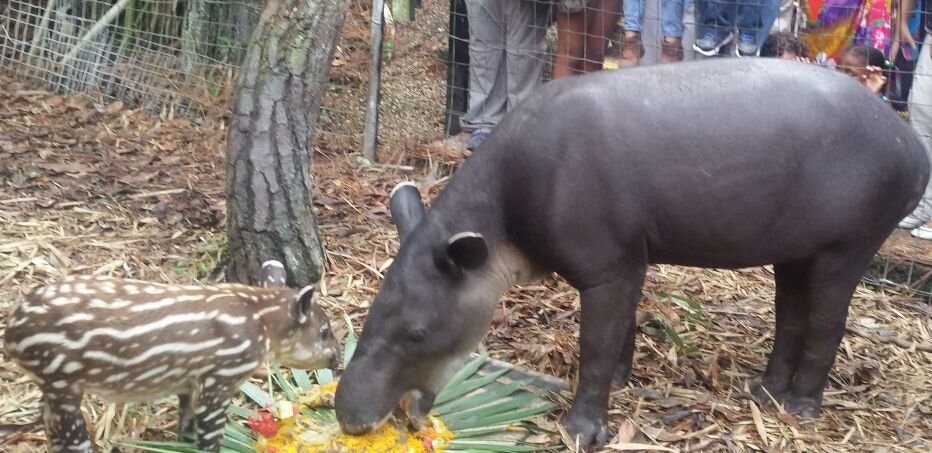
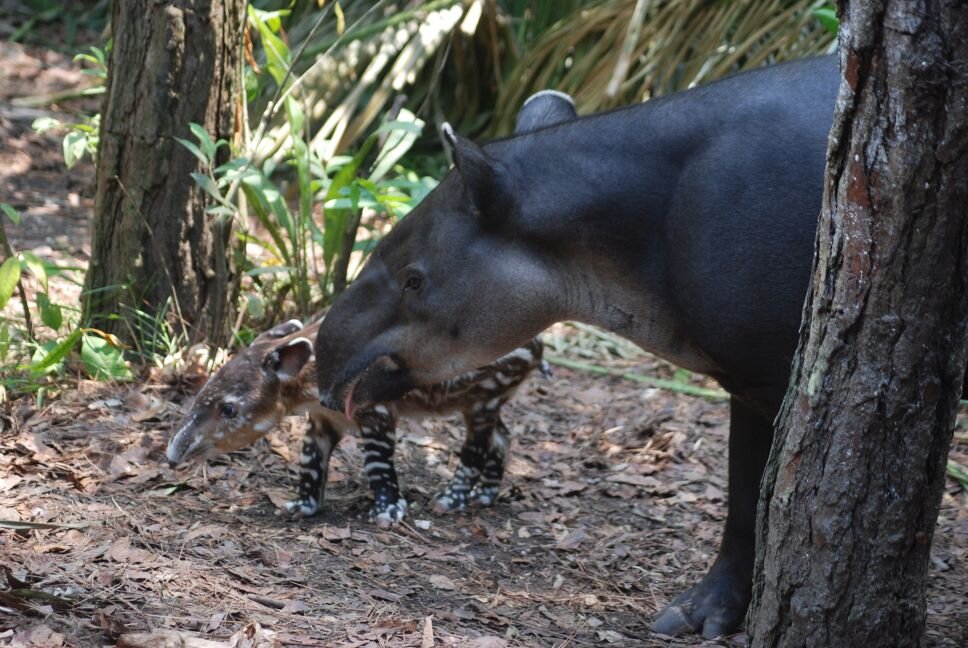
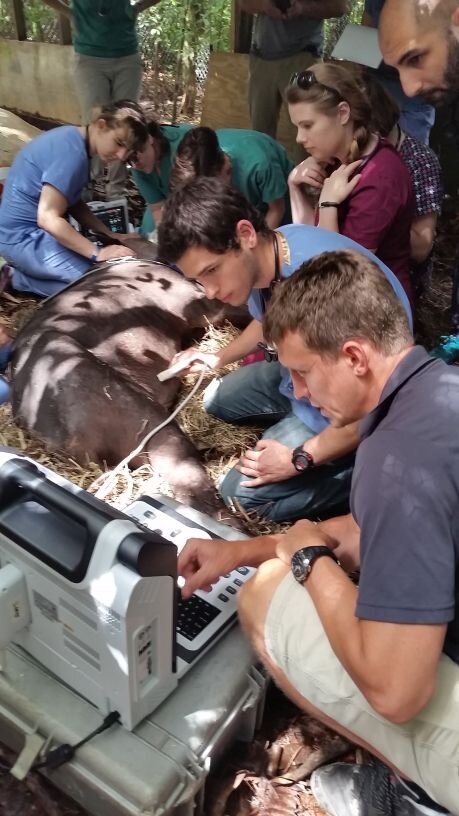
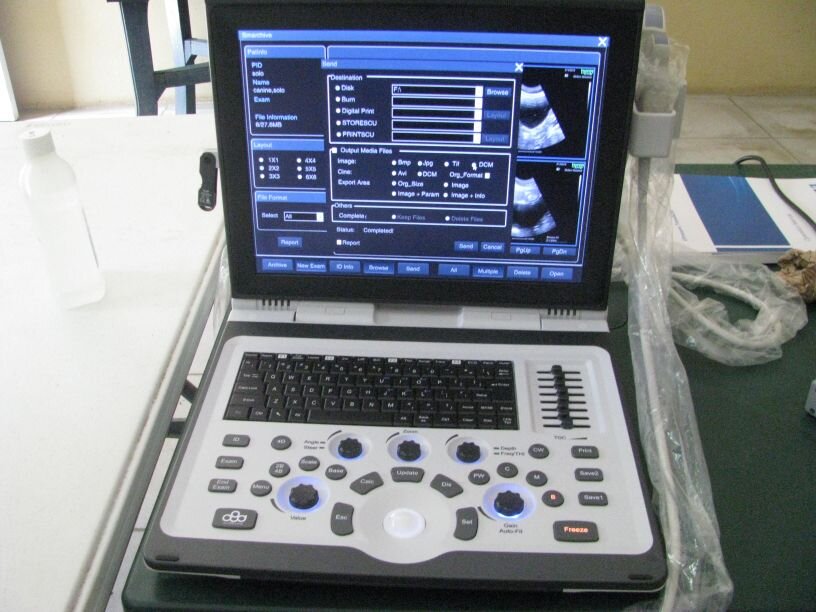
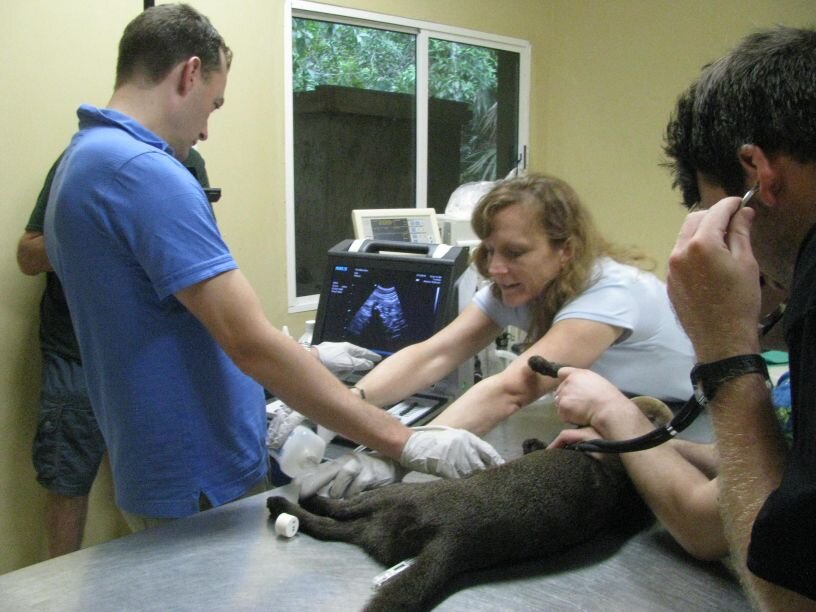
- The ultrasound was donated in time to track the pregnancy of Navidad, one of the Zoo’s Central American tapirs. Tapirs are endangered and are the national animal of Belize. (Note: All went well and Navidad gave birth to Sparks on April 10, 2018—see photo).
- The new ultrasound was also used to determine that a jaguarundi (Nina) was also pregnant and she gave birth a few days later. (See photo of jaguarundi undergoing ultrasound).
- Access to ultrasound technology is helpful to the Belize Zoo staff and animals. The ultrasound is similar to a sonogram, which allows the body to be viewed in three dimensions (3-D).
- Ultrasound is a non-invasive way to see inside the animal to evaluate the heart, lungs, kidneys, liver and reproductive organs.
- Images can be seen on the ultrasound viewing screen during the procedure as well as emailed to veterinary colleagues for their interpretation.
- The ultrasound machine is portable, which allows the staff to work on animals on the Zoo grounds as well as in the Veterinary Clinic.
To make the Vet Clinic and Commissary fully functional additional equipment is needed. Modern medical equipment is vital to the health and well-being of the animals living at the Belize Zoo. Many of these animals are endangered and are an integral component of the delicate ecosystem of the neo-tropics.
Your donation starts the ripple effect.
From pennies to dollars. From dream to reality. You have the power to make big change. The ripple has begun. Please help carry it far and wide. your help will reach places where you never expected that you could make an impact!
The BZNC Veterinary subcommittee has compiled the following list of hospital equipment needed to run a successful veterinary hospital/clinic.
Our next priority is to raise funds for the purchase of a Digital Radiography System (x-ray) $97,500.00 – A modern digital radiography system will allow for quick and professional images for any x-rays needed by zoo animals. This equipment is urgently needed. X-rays are performed at zoos to evaluate the internal organs of the chest and abdomen as well as the bones and joints. Currently, The Belize Zoo (TBZ) does not have access to an x-ray system. In an emergency, TBZ must transport an animal off-grounds for x-rays at a regional veterinary clinic. This can increase the risk to the animal. A modern radiographic system would allow for better animal care and better image quality. Included with the new equipment is a laptop computer and system to archive the images and allow TBZ to send the images to the veterinary sub-committee or specialists.
Additional equipment needed:
Dental equipment $15,000.00 High-speed and low-speed drill and dental cleaning/scaling unit plus additional dental instruments. All animals need routine dental care as well as emergency dental care. Dental disease is universal in the zoo world. The ability for TBZ to have a high-quality dental machine will allow for any animal to have a professional dental evaluation and treatment while under anesthesia.
Point of Care Chemistry Analyzer $15,000.00 A table top device to test blood on various zoo animals to aid in assessing their health. Diagnostic blood testing is a key way for veterinarians to assess the health of animals. Currently, TBZ blood samples are taken to regional clinics in Belize, which takes time and is expensive. It would be beneficial to test the samples in TBZ Vet Clinic. The largest benefit is that the tests could be performed while the animal is in surgery, under anesthesia or in a crisis. This leads to better patient care without waiting hours for a sample to be sent to a local lab and then receive results. Treatment could be instituted faster and with greater benefit.
Stationary and Portable Exam Lights $4,000.00 Two portable medical illumination lights for examination and treatment. The ability for the zookeeper and veterinary staff to evaluate each and every animal is critical to the animal’s well-being. A physical exam is best accomplished under appropriate medical lighting. This allows safety for the animal and handler and results in a better examination to detect medical problems. With the new Vet Clinic, it is much easier and safer to bring animals to the clinic for examination and treatment. Better lighting will significantly help with patient care.
Autoclave $5,000.00 A device that sterilizes surgical equipment prior to surgery. Surgery at TBZ is performed for both routine and emergency needs. Surgical equipment must be sterilized prior to use in order to maintain a clean environment. Sterile instruments minimize surgical risk and preserve the instrument’s lifespan. TBZ has an old, poorly-functioning sterilizer that does not operate at today’s standards, plus it takes significant time to function.
Ultrasonic Instrument Cleaner $1,500.00 A device that cleans instruments prior to placing in an autoclave (sterilizer). Prior to sterilization in an autoclave, all instruments should be cleaned in a disinfectant solution in an ultrasonic cleaning device. This machine efficiently cleans the instruments which results in safer surgical outcomes and longer lasting instruments.
Anesthesia Monitor Device $8,000.00 During and following surgery, all zoo animals should be monitored for heart rate, oxygen saturation, blood pressure and ECG. During all surgeries, zoo animals should be evaluated for their safety. In addition to listening to their heart and lungs, it is a standard of care to monitor various parameters including heart rate, oxygen saturation, blood pressure and ECG. Though there is risk with every anesthetic procedure, having the ability to check on the patient with this anesthesia monitoring device will greatly reduce that risk.
Dental Radiographic Processing Unit $15,000.00 A device to develop, modify and send animal dental images for evaluation. The zoo currently has a modern dental x-ray device to allow for veterinarians to take dental x-rays. However, TBZ does not have a unit to process the images. When needed, Cornell University has been kind enough to bring their unit to the zoo. If TBZ had their own processing unit and supplies, they would able to utilize the dental x-ray system year-round, resulting in better animal care.
Mobile Treatment Table with Scale $4,500.00 A stainless steel table on wheels with a scale allowing for mobile transport of a sedated or ill animal. Some zoo animals are large enough that it is unsafe to transport them by sheer man-power. A mobile treatment table will allow the staff to transport a sick or sedated animal from the zoo to the clinic. It will also serve as an examination table to weigh, examine and treat injured animals. Additionally, an animal can be transported from the clinic treatment area to the surgery area saving time and minimizing risk to the animal and staff.
Miscellaneous Equipment and Supplies $6,000.00 TBZ needs modern equipment to use for routine and emergency animal care. Equipment needed includes: Ophthalmoscope, Otoscope, Clippers, a veterinary microscope, a set of laryngoscope blades, a handheld capnometer and pulse oximeter (to measure O2 and CO2 during anesthesia), small animal scales, safety gloves and nets, and clipper blades. Having this equipment will be beneficial for routine and emergency care of the animals at TBZ.
How you can Help:
By donating for the hospital and commissary equipment. Any amount you can give is greatly appreciated and will go towards improving and saving the lives of the Belize Zoo's animals.
